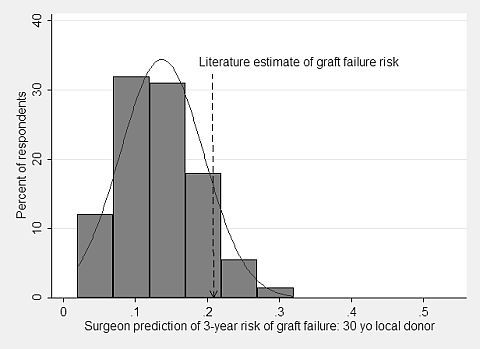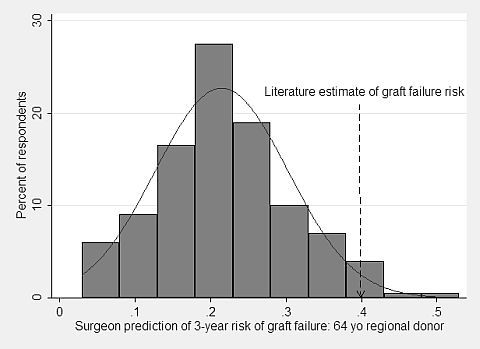Systematic Bias in Surgeon Predictions of Donor-Specific Risk of Liver Transplant Graft Failure
University of Michigan, Ann Arbo
Meeting: 2013 American Transplant Congress
Abstract number: 192
BACKGROUND: The decision to accept or decline a liver allograft for a patient on the transplant waiting list is complex. We hypothesized that surgeons are not accurate at predicting donor-specific risk. METHODS: Surgeon members of the American Society of Transplant Surgeons were invited to complete a survey in which they predicted 3-year risk of graft failure for a 53 year old man with alcoholic cirrhosis and MELD 21, with a liver from each of the following donors: 1) 30 year old local donor with traumatic brain death, or 2) 64 year old regional donor with brain death from stroke. RESULTS: Complete responses were obtained from 201 surgeons whose self-reported case volume represents 97% of liver transplants in the U.S. Surgeon-predicted 3-year graft failure risk varied widely, as shown in the histograms below with overlaid normal distribution curves. In scenario 1, 90% of respondents provided lower estimates of graft failure risk than the literature-derived estimate of 21%. In scenario 2, 96% of responses were lower than the literature-derived estimate of 40%. There was a bimodal distribution regarding the role of visual inspection of the donor liver in the decision to transplant a particular organ; two-thirds of respondents replied that visual inspection played a critical role in 10%-30% of cases, while one-fifth replied that it played a critical role in 80%-100% of cases. CONCLUSION: Surgeons vary widely in their predictions of donor-specific risk of graft failure. We have demonstrated systematic bias towards inaccurately low estimates of graft failure – particularly for higher risk organs. These findings provide impetus for development of decision support tools for organ offers.


Surgeon estimate of graft failure risk; vertical dotted line shows literature estimate (Feng et al. AJT 2006).
To cite this abstract in AMA style:
Volk M, Merion R. Systematic Bias in Surgeon Predictions of Donor-Specific Risk of Liver Transplant Graft Failure [abstract]. Am J Transplant. 2013; 13 (suppl 5). https://atcmeetingabstracts.com/abstract/systematic-bias-in-surgeon-predictions-of-donor-specific-risk-of-liver-transplant-graft-failure/. Accessed February 16, 2026.« Back to 2013 American Transplant Congress
